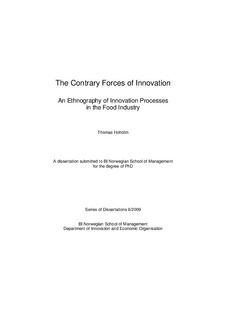| dc.description.abstract | The purpose of the study is to contribute to our understanding of innovation processes. The overarching research question has been: How do innovation processes evolve over time, and, in particular, how are knowledge and technology developed and commercialised?
Through an ethnographic case study of innovation in between the biomarine and agricultural industries, I have traced and observed an innovation process from idea to commercialisation. Thus, the rich descriptions of this complex phenomenon are a central contribution from this study. Starting out with the development of a couple of novel technologies for processing fish, and establishing a collaboration between Tine (dairy/agriculture cooperative) and Bremnes Seashore (fish farm), the process ended up with what is now well known in Norwegian supermarkets and restaurants as ‘Salma’. This innovation process was related to industrial change within both the aqua- and agriculture industries, stimulated by the research policy on ‘blue-green’ innovation. Thus, it is both a detailed ‘inside account’ of an innovation process, and an example of how various local interactions may take part in shaping institutional/industrial change.
I have used the methodological and analytical tools of actor-network theory in the study, as I have ‘followed the actors’ as they strived to move the innovation towards realisation. An analytical scheme has been developed in interaction between the empirical data and my theoretical basis. This scheme has then been used to analyse, and theorise about, the case study, and in this way both challenge and complement existing theory on innovation processes. From this, it is suggested that innovation processes are characterised by uncertainty and controversy, in particular in the interaction between the mobilising of actors-networks and the exploration of knowledge. Moreover, the uncertainty and controversy are increased by the fact that the innovation process is situated within a network of interconnected processes. Some theoretical implications for the theory of innovation processes are suggested in relation to (1) the mobilisation of actors, resources and decisions towards innovation, (2) the exploration of knowledge to realise innovations, and (3) the interaction between mobilisation and exploration processes on the one hand, and between different actor-networks/organising processes on the other. | en |
